Planning your perfect French holiday: From Parisian style to Provençal charm
Are you looking for a little of that je ne sais quoi, a little bit of joie de vivre? Then a holiday in France is just what the docteur ordered! From the iconic allure of Paris, to the sun-kissed shores of Provence and the French Riviera, each region paints its own picture. As a global centre of fashion, art, cuisine and wine, spread across a flourishing landscape, you could spend a lifetime exploring every nook and cranny of France, and yet never come near to exhausting its riches. It's no wonder then, that 89 million heart-fluttering tourists roaming its majestic mélange of enchanting cities, coastal resorts and hillside châteaux every year – making it the world’s most visited country! However, with so many enchanting places to discover, it can be difficult to know where to start when planning a perfect French holiday! Luckily, with this guide we aim to unravel the wonders of holidaying in France, walk you through some of the country's diverse landscapes, cultural heritage, and culinary delights, and help you plan a little rendez-vous with your dream destination, in what is one of Europe’s most picturesque nations.
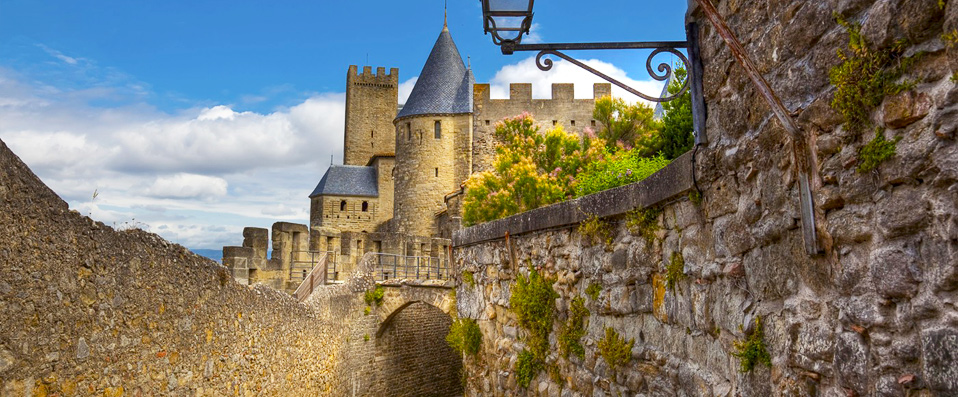
Ah, Paris!
France's capital has accumulated many names over the years, the "City of Love", the "City of Light", the "Capital of Creation" – whatever you call it, Paris is a must-visit destination and the number one choice for a holiday in France, with its unique atmosphere and cultural influences, its art, history, architecture. It is home to some of the world's most famous landmarks, from the Notre Dame Cathedral, to the Arc de Triomphe, or the magnificent Louvre Museum. And of course, the most emblematic attraction of all, the Eiffel Tower – standing 300 meters high, the "Iron Lady of Paris" is one of the world's most visited monuments.
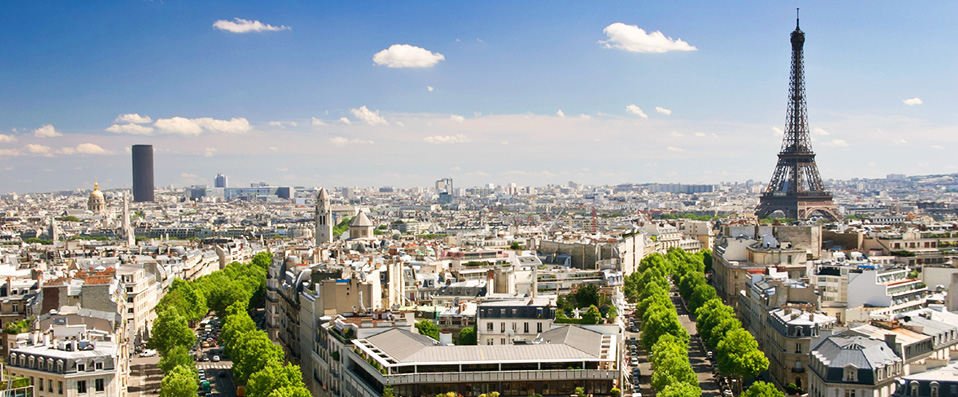
Wander through the charming streets of Montmartre, unveil the bohemian vibes of Le Marais, and enjoy a leisurely Seine River cruise or just a romantic evening stroll along its banks. Indulge in haute cuisine at Michelin-starred restaurants or relish gourmet street food at bustling markets like Rue Mouffetard. And finally, don't miss the legendary Avenue des Champs-Elysées, where you know you are in the heart of the world's fashion capital.
A little further afield, a wealth of places to visit sit just outside the city. Start with one of the emblems of French royalty, the beautiful Château de Versailles, considered the largest palace in the world. Remaining on the theme of the palaces and castles, head in the direction of Fontainebleau with its Château de Fontainebleau and immense surrounding park, or visit the superbly ornate Château de Vaux-le-Vicomte, with its with domed roof and expansive formal gardens. Make your way over to Disneyland Paris to find the iconic fairy tale castle nestled in this world-famous theme park. Providing fun for all ages, come face to face with all the Disney heroes and enjoy the thrilling rides and attractions.
Venturing beyond Paris
France's allure extends far beyond its capital, to each of the corners of this hexagonal country. From the windswept beauty of the Atlantic Coast, to the Alpine peaks, or the sunny Mediterranean coast. Wherever your go, discover beautiful natural landscapes, sprawling vineyards, charming architecture, many a historic châteaux, and exquisite cuisine. Here's a little insight into just some of France's best cities and regions to help you plan a perfect French holiday:
Normandy:
Normandy's allure lies in its rich history and breathtaking landscapes. Visitors are drawn to the historic significance of the D-Day landing beaches, paying homage to the bravery of World War II soldiers. Charming towns like Honfleur and Bayeux showcase medieval architecture, while the impressive Mont Saint-Michel, with its abbey sits perched on a rocky island amidst the surrounding tidal flats.
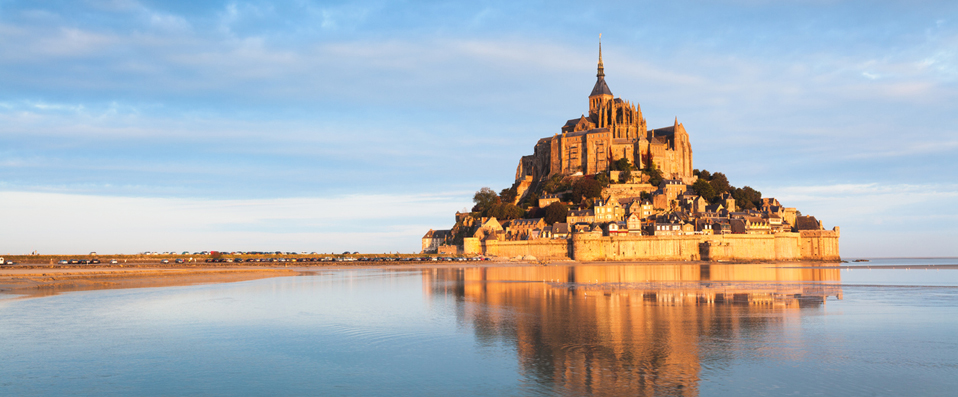
Classified a UNESCO World Heritage Site since 1979, the Mont Saint-Michel is a surprising and mythical place with a long history – used as a Gaulish stronghold in the 6th and 7th centuries, and later played a role in the Norman conquest of England in 1066.
Brittany:
The rugged coastline of Brittany, adorned with stunning cliffs and sandy beaches, is a haven for nature lovers and surfers alike. Its Celtic heritage echoes through ancient megalithic sites such as Carnac's standing stones. The region's maritime history is evident in its bustling fishing ports like Saint-Malo, while charming medieval towns like Dinan exude old-world charm.
Meanwhile its capital, Rennes, is a city of art, history... and retail therapy! It is a city of contrasts from its charming cobbled medieval streets to the large tree-lined boulevards, the half-timbered buildings historic buildings to the modern glass boutiques and avant-garde architecture, it is a perfect blend of past and present.
Loire Valley:
Known as the "Garden of France" the Loire Valley is a UNESCO World Heritage site consisting of enchanting green landscapes, dotted with majestic châteaux, and serene riverside towns. It is no wonder why nine kings of France established their court here, transforming it into the region of castles. Visitors can immerse themselves in the opulent history of these Renaissance masterpieces, exploring their grandeur, lush gardens, and intriguing stories. Meanwhile, the region's scenic vineyards produce world-renowned wines, offering delightful wine-tasting experiences.
Here is our selection of must-visit Loire castles:
- Château de Chambord, set in Europe's largest closed forest park, is a Renaissance masterpiece, thanks in particular to its inventive staircase which recalls sketches by Leonardo da Vinci.
- Château d'Azay-le-Rideau, is one of the most architecturally harmonious castles, again considered a masterpiece of the early Renaissance.
- Château Royal d'Amboise, a truly impressive former medieval fortress, built on a rocky spur overlooking the town of Amboise and the River Loire. It is known to have hosted numerous kings and nobles, along with Léonard de Vinci (who died there and is buried in the chapel).
- Château de Chenonceau, spanning the Cher River in a one-of-a-kind structure, it boasts impressive gardens.
- Château de Villandry, a UNESCO World Heritage Site, is famous for its magnificent terraced Renaissance gardens, considered to be among the most beautiful in Europe.
French Alps:
The Alps are renowned for their extensive natural beauty and diverse array of summer and winter activities. And a holiday in the French Alps promises nothing less, with some of the best mountain resorts in the world, from Chamonix and Courchevel, to Megève and Val d'Isère. In winter, skiers and snowboarders are drawn to the pristine slopes and lively après-ski. While summer brings spectacular hiking, mountain biking, rock climbing – or for some more adrenaline-pumping experiences – paragliding, and white-water rafting. All this against a stunning backdrop of snow-capped peaks, lush valleys, and glacial lakes. The charming alpine villages, adorned with wooden chalets and traditional architecture, are complemented by warm hospitality, and hearty regional cuisine.
The French Alps truly offer a year-round outdoor paradise for those seeking exhilarating mountain sports or simply some tranquillity, fresh air, and natural surroundings.
Burgundy:
Renowned for its prestigious wines, Burgundy boasts some of the world's most coveted vineyards. Beaune, the wine capital, hosts the Hospices de Beaune, a 15th-century hospital turned museum showcasing the region's winemaking history. Meanwhile, the medieval charm of towns like Cluny, along with the serene beauty of its rolling countryside, adds to Burgundy's allure.
Steeped in history, Dijon, Burgundy's charming capital, is known in particular for its mustard. The city's medieval and Renaissance architecture, notably the Palace of the Dukes of Burgundy and the Saint-Bénigne Cathedral, captivate visitors with their grandeur, while Dijon's atmospheric old town is filled with narrow cobblestone streets, quaint squares, and charming half-timbered buildings. Discover museums like the Musée des Beaux-Arts, with its impressive collection of art, and traditional culinary delights, from gourmet restaurants to local markets brimming with regional produce. As the gateway to the prestigious Burgundy wine region, Dijon serves as an ideal starting point for exploring the surrounding vineyards and indulging in wine-tasting tours.
Lyon:
Lyon, the gastronomic capital of France nestled at the confluence of the Rhône and Saône rivers, offers a captivating blend of history, culture, and culinary delights. Its UNESCO-listed Old Town, Vieux Lyon, mesmerises with its Renaissance architecture, traboules (hidden passageways), and charming cobblestone streets bustling with artisan boutiques and bistros. The city's rich heritage dates back to its founding by the Romans as the capital of Gaul. Visit landmarks like the Basilica of Notre-Dame de Fourvière, offering panoramic city views, and the ancient Roman amphitheatre, the Théâtre Antique de Lyon.
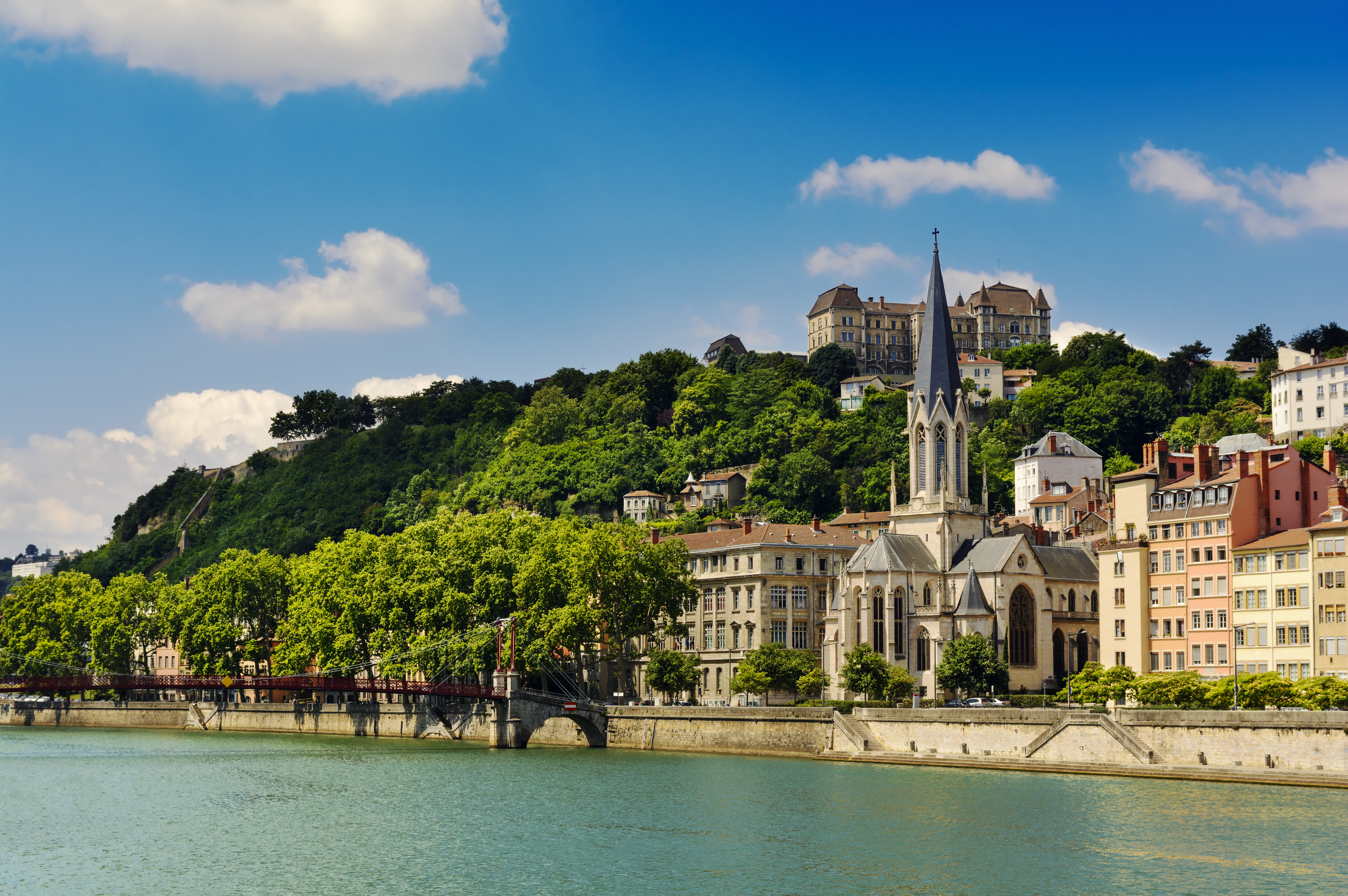
Renowned for its exceptional culinary scene, Lyon entices visitors with its traditional bouchons serving up local specialities like coq au vin and quenelles. Moreover, Lyon's vibrant cultural life thrives through its festivals, theatres, and museums, including the Musée des Confluences, an architectural marvel that celebrates science and anthropology. Lyon embodies a delightful fusion of historical charm, artistic flair, and gastronomic indulgence, making it an unmissable destination in France.
Dordogne:
The Dordogne, nestled in the heart of southwest France, enchants with its timeless beauty, prehistoric wonders, and lush landscapes. This region, adorned with winding rivers, lush valleys, and captivating medieval villages, offers a journey through history and natural splendour. Dordogne's most iconic feature is its prehistoric caves, notably Lascaux, adorned with ancient cave paintings that depict the artistry of our distant ancestors. The region's medieval heritage comes to life in charming towns like Sarlat-la-Canéda, where impeccably preserved buildings and cobblestone streets invite exploration. The tranquil Dordogne River meanders through verdant landscapes, flanked by imposing châteaux such as Château de Beynac and Château de Castelnaud, offering a glimpse into the area's medieval past. Dordogne's allure lies in its idyllic scenery, prehistoric marvels, and historic charm, making it a haven for those seeking a serene retreat amidst France's cultural and natural treasures.
Bordeaux:
It is difficult, if not impossible, to talk about Bordeaux without starting with the world-famous wine produced in the area – after all, this is to what the city largely owes its wealth and influence today. So, be sure to treat yourself to a tour and wine tasting in one of the surrounding wine regions, such as Médoc or Saint-Émilion.
As for the city itself, the elegant capital of the Nouvelle-Aquitaine region in southwestern France, is a UNESCO-listed city, and for good reason. It boasts a harmonious blend of historic architecture and contemporary lifestyle. At its heart, the Place de la Bourse, showcases 18th-century opulence with its iconic Water Mirror and majestic facades. Stroll along the Garonne River's quays, lined with chic boutiques, charming cafés, and lively markets. And be sure to visit the Saint-André Cathedral and Saint Michael's Basilica. This city's gastronomic scene shines with gourmet restaurants and local markets offering delectable regional produce, while Bordeaux's world-renowned wine industry is celebrated through the Cité du Vin, an immersive museum dedicated to wine culture.
Biarritz:
This chic coastal town on the Basque coast is a surfer's paradise with its golden sandy beaches and thrilling waves, including the iconic Grande Plage and the renowned surfing spot, Côte des Basques. Biarritz exudes elegance with its Belle Époque architecture, stylish promenades, and luxurious hotels and seaside villas.
Biarritz's Basque heritage is notably evident in its gastronomy, with a fusion of French and Spanish flavours, showcased in local dishes like pintxos and Basque pastries, but also in its numerous cultural festivals. The town enjoys a lively atmosphere, with beachfront bars, and trendy boutiques and some fantastic markets. This is a coastal gem, attracting sunseekers, surfers, and those searching for a chic seaside escape.
Provence:
Provence embodies the essence of southern France. Discover stunning landscapes with rolling vineyards and the iconic lavender fields, and a rich history, visible in ancient Roman ruins like the Pont du Gard and the well-preserved city of Arles with its Roman Amphitheatre. One of Provence's gems is the Luberon, a stunning natural park boasting quaint towns like Gordes and Roussillon, renowned for their ochre-hued cliffs and picturesque streets. The region's medieval past comes alive in Avignon, home to the majestic Palais des Papes (Palace of the Popes), a UNESCO World Heritage site, and the iconic Pont Saint-Bénézet.
To enjoy a holiday in the heart of Provence, there’s perhaps no better place to stay than Aix-en-Provence. Within easy reach of much of the region, this charming town has a lot to offer in its own right. Get a feel of the city by strolling up the central Cours Mirabeau avenue, and through the old town, browsing the various markets as you go. Head to The Granet Museum, the Pavillon de Vendôme and the Vasarely Foundation to soak up some art and history. Then, be sure to follow in the footsteps of Cézanne, the artist who is synonymous with Provence. Visit his old studio, then set out on a hike up the Mont Sainte-Victoire, the subject of many of his paintings. From to the sanctuary at the top, take in the breathtaking panorama of the surrounding region.
The appeal of Provence extends to its delectable cuisine – savour Provençal specialities like ratatouille, tapenade and the calisson d’Aix, accompanied by fine wines from appellations like Châteauneuf-du-Pape and Côtes de Provence. Embrace the gentle pace of Provençal life, on a serene escape steeped in natural beauty and cultural richness.
Marseille:
France's oldest city and a bustling Mediterranean port, Marseille is a melting pot of diverse cultures, reflected in its street art, authentic markets and diverse neighbourhoods. The lively Vieux-Port (Old Port) serves as the beating heart of the city, where fishermen sell their catch alongside trendy bars and seafood restaurants. The Notre-Dame de la Garde basilica dominates the skyline, and offers panoramic views of the city and the azure waters beyond. The historic Le Panier district, charms visitors with its narrow streets adorned with street art, artisan shops, and inviting cafes. La Canebière, the city's main street, bustles with activity, showcasing Marseille's cosmopolitan vibe. Exploring the city unveils a range of historical landmarks such as the 17th-century Fort Saint-Jean and the Abbaye Saint-Victor, a medieval church with a fascinating history. The MuCEM (Museum of European and Mediterranean Civilisations) is modern architectural marvel, with exhibitions highlighting Mediterranean cultures.
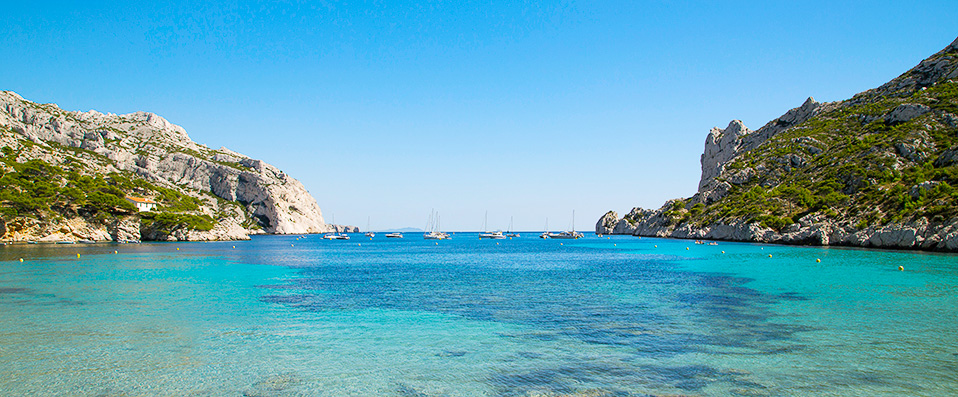
The stunning surrounding coastline offers opportunities for relaxation and water activities, with beaches like Plage des Catalans and Calanque de Sugiton inviting visitors to to soak up the sun, swim, and go snorkelling in the crystal-clear waters.
Meanwhile, Marseille's delightful culinary scene puts a strong emphasis on seafood and Mediterranean flavours, with dishes like bouillabaisse, the famous fish stew, or panisses (chickpea flour fritters) and pastis, a traditional anise-flavoured drink. The city also plays host to many cultural events and festivities, with music festivals like Marsatac, or traditional celebrations like the Fête de la Musique. Overall, Marseille is a captivating destination that showcases the diversity and dynamism of southern France.
French Riviera:
The French Riviera, or Côte d'Azur, is an iconic stretch of coastline in southeastern France. Encompassing stunning landscapes, sun-soaked beaches, cultural richness, and chic accommodations, it has been attracting holiday makers since the 19th-century. At it's heart lies Nice, a city that combines sophistication with a relaxed atmosphere. Its scenic Promenade des Anglais seaside walkway is lined by grand Belle Epoque hotels, while the narrow streets, colourful facades, and bustling markets of its Old Town, Vieux Nice, exude Provençal charm. Meanwhile, museums like the Musée Matisse and Musée Marc Chagall, showcase famous artworks by the respective artists.
The town of Cannes, is renowned of course for its international film festival, and its Boulevard de la Croisette is lined with luxurious hotels and designer boutiques. Its historic Le Suquet district is crowned by the medieval Cannes Castle, which offers panoramic views of the city and sea. Further east, Antibes' charming old town features cobblestone streets, a bustling market, and a Picasso Museum, while Menton, known for its lemon festival and botanical gardens, boasts an enchanting old town and serene beaches.
With world-class restaurants, beachfront bars, and upscale nightclubs. the French Riviera offers a sophisticated and lively social scene. Most notably perhaps, in Saint-Tropez, a picturesque town which boasts an air of exclusivity. Its iconic Vieux Port is filled with luxurious yachts, chic cafes, and trendy clubs, while the cobblestone streets of the old town are lined with boutique shops and art galleries.
The French Riviera is also haven for beach lovers, offering sun-kissed shores and crystal-clear waters, and beaches like Plage de Pampelonne in Saint-Tropez and Paloma Beach in Saint-Jean-Cap-Ferrat exude sophistication. Meanwhile, a boat ride to one of the region's beautiful islands, such as Porquerolles and Port-Cros, or Sainte-Marguerite and Saint-Honorat, are the ideal way to complete your trip.
Crafting Your Itinerary
Designing an itinerary involves considering the seasons and specific interests. Spring welcomes cherry blossoms and café terraces in Paris, while summer brings out the lavender fields of Provence. Efficient transportation options like France's high-speed TGV trains connect major cities, and a plenitude of luxurious accommodations await around every corner.
When is the best time to visit France?
With it's diverse geography, climate and culture, choosing the best time to visit France depends where you decide to go, and what you want to do. Spring (April to June) is delightful, with blooming flowers, mild temperatures, and fewer tourists, ideal for exploring cities and countryside alike. Summer (July to August) is peak tourist season, offering warm weather and a plethora of events, festivals, and outdoor activities – coastal regions and popular cities are bustling. Autumn (September to November) brings pleasant weather and fewer crowds, and is the perfect time for wine tours and outdoor adventures. Winter (December to February) provides a magical atmosphere with festive decorations, Christmas markets, and superb skiing in the French Alps – though coastal regions tend to be quieter during this time. Each season in France has its own charm, catering to various interests and activities.
What is the best way to get to and around France?
Getting to France is easy due to its well-connected transportation network. International visitors will find that France has a number of well-served international airports spread across the country, from Charles de Gaulle Airport or Orly Airport in Paris, to Lyon's Lyon-Saint Exupéry Airport, Bordeaux's Bordeaux–Mérignac Airport, or Marseille-Provence Airport and Nice Côte d'Azur Airport in the south. France also has an extensive rail network, with high-speed TGV trains offering convenient, comfortable and efficient travel between cities and regions, and from neighbouring countries. Alternatively, travelling by car provides flexibility, especially for exploring rural areas and smaller towns. Navigating France during a holiday can be a seamless experience, given the variety of transportation options catering to different travel preferences.
Where is the best place to stay in France?
Selecting the right accommodation can define the holiday experience. Paris offers plenty of luxury hotels and chic boutique accommodations across its diverse neighbourhoods, while Provence presents charming countryside villas, elegant guesthouses, and historic hotels immersed in the picturesque landscapes. The French Riviera, boasts opulent resorts, and grand Belle Epoque hotels with sea views, and a glamorous atmosphere. Along the Atlantic Coast you will find numerous spa and wellness hotels offering Thalassotherapy, while in the French Alps you'll find plenty of rustic chalet-hotels, with all the mountain slopes at your doorstep.
Luxurious four and five-star hotels offer superb comfort and hospitality with a wide range amenities and services, while chic boutique hotels, are a great choice for a more romantic stay. For a unique French experience, looks for one of the many authentic Chateaux or manoirs (manor houses) which have been converted into elegant accommodations. Auberge guesthouses often provide a more intimate characterful experience, with cosy rooms and a chance to interact with locals, especially in rural areas. Meanwhile, Glamping is an increasingly fashionable choice, luxurious camping accommodations with upscale facilities amidst France's natural beauty.
Conclusion
Wherever you go in France, sampling French cuisine is an integral part of the holiday experience, so be sure to indulge in breakfasts of croissants and café au lait, and explore the French bistros for the local classic dishes from boeuf bourguignon to cassoulet. Indulge in wine tastings and visit markets to sample the array of cheeses, charcuterie, and artisanal produce. To truly immerse yourself in French culture, participate in local festivals, from Lyon's Festival of Lights to Avignon's theatre festival. Engage with locals, practice basic French phrases, and appreciate the warmth of French hospitality. Take a look at our extensive VeryChic offers on luxury hotels in France to find your ideal accommodations, and hopefully this guide has provided you with the essentials to plan a perfect French holiday.
